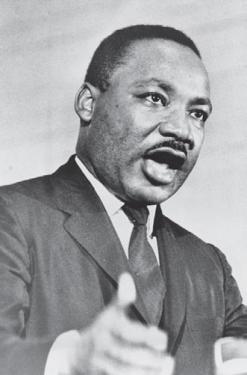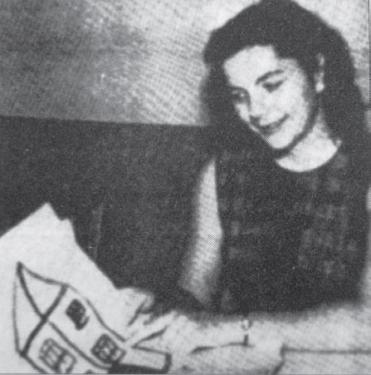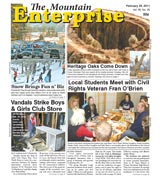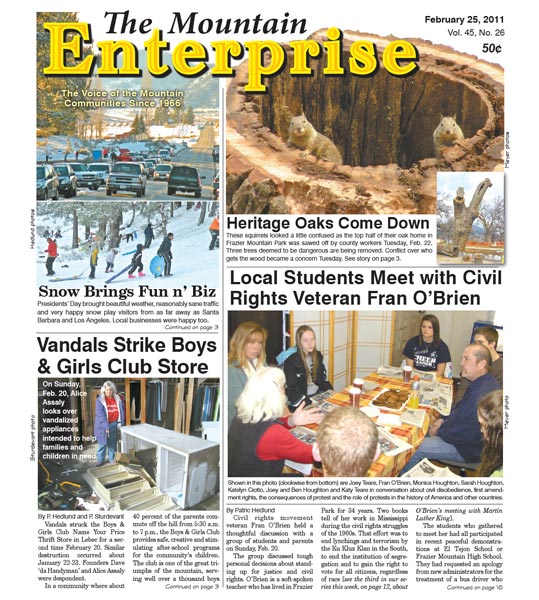
Image 1 of 3
Martin Luther King came to visit Freedom Summer workers in Vicksburg, Mississippi in 1964. He told Fran O'Brien her work with children is creating the future.
Image 2 of 3
College student Fran O’Brien taught in Mississippi in 1964, not knowing she would meet both Martin Luther King Jr. and, one night, the Ku Klux Klan (Whittier Daily News, in Bruce Watson’s Freedom Summer).![Fran O'Brien is included in two books about the civil rights movement. Bruce Watson's new book, Freedom Summer, tells of her meeting with both Martin Luther King and an attack on her by the Ku Klux Klan. The book is available at Amazon.com. [Photo by Gary Meyer for The Mountain Enterprise]](https://mountainenterprise.com/fds/images/story/fs_8269_3.jpg)
Image 3 of 3
Fran O'Brien is included in two books about the civil rights movement. Bruce Watson's new book, Freedom Summer, tells of her meeting with both Martin Luther King and an attack on her by the Ku Klux Klan. The book is available at Amazon.com. [Photo by Gary Meyer for The Mountain Enterprise]
The story of Frazier Park’s Fran O’Brien is told in a new book on America’s civil rights struggles: Freedom Summer (available at Amazon.com) by Bruce Watson. Here is a third excerpt about her experience in 1964. See part one andpart two.
Fran O’Brien had been teaching arts and crafts at the Vicksburg Community Center for three weeks when her students demanded meatier subjects.
One day, rummaging through the center’s library, the children spotted an American history text. They brought it to the gentle, dark-haired teacher with the funny accent. They wanted to learn history too, they told Fran. Just like the big kids.
With a slight smile, Fran opened the tattered book and instantly noticed the publishing date—1930. The narrative began, “The history of America really begins in England because all Americans come from England.” She looked at the faces before her. She closed the book.
Three weeks in Mississippi had taught Fran far more than she had taught her students.
When a girl in a school variety show recited “Four score and seven years ago,” Fran had learned not to be impressed by rote memory.
“Do you know what the Gettysburg Address means?” she asked. “Yes,” the girl replied. “It means that all the slaves were free, and it was signed July 4, 1776.”
Reading to her students, Fran learned that Little House on the Prarie books did not mean as much to black kids in Mississippi as they did to a white girl growing up in Southern California. She began searching for other stories.
When Fran got nervous, she learned not to speak too quickly. After moments of blank stares, one boy finally said, “We can’t understand y’all.”
And one morning, when a car came to take her to the Freedom House, Fran learned to check carefully before going outside. The car was not her morning ride. She and her roommate were left standing by the road when a motorcycle cop pulled up. He asked the women if they were runaways, if they were “of age.” Then a second cop came and asked if they were civil rights workers. Fran’s roommate sweet-talked the cops into letting them go. The education of Fran O’Brien continued.
On the evening a bomb hit Vicksburg’s Melody Lounge, Fran learned not to tell her mother the whole truth about Mississippi.
“You haven’t a thing to worry about,” she wrote home that night. “Vicksburg is a very quiet town.”
And with each class, Fran was learning that not all children are charming. During afternoon chorus, two boys insisted on croaking like frogs until Fran blew up at “the little darlings.” Another girl did daily “Jekyll-Hyde transformations,” racing around the room, threatening other students. But Mississippi’s saddest lesson taught Fran how Jim Crow crippled every black child’s confidence.
Thrilled by her students’ creativity, she was dismayed to see so many kids throw their paintings into the wastebasket. She took them out and put them on her classroom walls.
Freedom Summer’s makeshift logistics had bounced Fran around Vicksburg. In mid-July, the community center was condemned. Fran and her colleagues packed their supplies and moved two blocks to the Freedom House, where their classes had to compete with voter registration. Next, Fran had to leave her host home. The woman there had grown terrified of retaliation. Fran moved into a larger home with antique furniture and even china, all proudly tended by the black woman Fran would forever call “Mrs. Garrett.”
The match was ideal. Mrs. Garrett, a rotund woman with thick iron-gray hair, was a retired teacher with ample advice for a beginner. Every evening, after Fran came home from a long day of classes, Mrs. Garrett sat and talked. Talked about her grandmother, who when freed, got down on her knees and hugged her children, thanking Jesus that “my babies can’t be sold away.” Talked about teaching in Vicksburg’s black schools, with few books, few resources, just empathy and common sense. Talked about what to do with a history book decades old and whitewashed with lies:“Well, you just read the book, and then you give them the right information.”
The next day, Fran started teaching American history. Opening the 1930 text, she read, “The history of America really begins in England.” “Now,” she said, “what might be wrong with that sentence?” A hand went up.
“Well, lots of people came here who weren’t from England.” Fran smiled. And what other countries might Americans have come from? Her students began touring the globe.
“France?”
“Yes.”
“Italy?”
“Certainly.”
“Germany?”
They moved on to Mexico and South America. Fran was impressed with their geography, but couldn’t help wonder. After they tried China and India, Fran asked, “Well, what about Africa?” The classroom fell silent. Finally, a little girl raised her hand.
“Does that count?”
Fran had to blink back tears.
“Yes,” she said softly. “Yes, that counts.”
A few days later, Fran wrote home again:
“Sometimes I feel I’m not doing much, but…I still feel our real hope of success is in the children. They can’t avoid fear, being intelligent, nor resentment, being human. But I hope the stimulation of the Freedom School and the examples of determination set by Negro workers will save them from the apathetic “What’s the use?” attitude which oppresses and binds people more than the law ever could.”
On Thursday, July 23, Fran found Vicksburg’s Freedom House “in a dither.” All afternoon, people ran in and out, straightening, cleaning, preparing. Martin Luther King was coming. He was due around 6:00 p.m.
The day before, King had shared coffee with COFO workers in Jackson, then canvassed for Freedom Democrats. That night, he had spoken at the Masonic Temple. The following morning, an FBI wiretap of King’s Atlanta home picked up a death threat. But J. Edgar Hoover, afraid the eavesdropping would be revealed, had given a standing order not to tell King about such threats, so the FBI merely tightened its guard.
On Thursday afternoon, King met with Bob Moses, James Farmer and other leaders, discussing strategies for Atlantic City. After a press conference where he called Mississippi “the worst state in the Union,” he headed for Vicksburg.
White Vicksburg paid no attention to Martin Luther King. The Miss Mississippi pageant was underway. Captivating the town with parades and parties, the pageant was in its third night— the swimsuit competition.
Across town, Fran O’Brien was finishing classes as the dinner hour approached. King was scheduled to dine with volunteers, then speak at a church, but he was late, and some were beginning to wonder if he was coming at all. Toward 6:15 p.m., Fran was straightening her classroom when someone told her to hurry. The last car was leaving. She rushed down the long driveway, and there in the front seat was Martin Luther King.
At first, Fran thought it must be someone who merely looked like him, but when a friend asked whether she was just going to stand there gawking, Fran jumped in the back. All the way to dinner, other volunteers fell over themselves to tell King about their summer work. Fran sat in silence. Finally, King turned around.
“And what about you, young lady?” he asked. “What do you do in the project?”
“Nothing,” Fran managed to say. “I just work with the kids.”
“What do you do with the kids?”
Shyness stifled Fran, but another volunteer burst in and told King what a great teacher she was, doing arts and crafts, backyard games, and now a chorus and piano and sewing lessons….Fran smiled weakly. King studied her, then asked, “Do you call that nothing?”
“No, sir.”
Then, getting serious as only Martin Luther King could get serious, he said, “Young lady, don’t you ever say you ‘just work with the kids.’ Our children are the future and you are forming it.” After dinner, King spoke to a boisterous crowd, but Fran O’Brien would not remember a thing he said that was more important than what he said to her.
The following morning, back in Jackson, King taped a TV show, then headed for Philadelphia. Bob Moses had not wanted King to venture into the town where a mob had recently driven off an NAACP leader, but King insisted. No events were planned there; no locals were expecting him. FBI agents met his caravan at the Neshoba County line and cleared the road ahead.
An hour later, blacks in Independence Quarters were startled to see fifteen cars rumble over the railroad tracks. Kicking up red clouds of dust, the caravan came to a halt in front of a church. King walked again through the streets and stopped at another pool hall, this time taking off his jacket, rolling up his sleeves, and playing a game of eight ball. He lost. Climbing on a bench, he addressed the crowd: “Three young men came here to help set you free. They probably lost their lives. I know what you have suffered in this state, the lynchings and the murders. But things are going to get better.”
Then, quoting an old spiritual, King told the group, “Walk together, children, don’t you get weary.” As he left the pool hall, an old woman approached and reached out a withered hand. “I just want to touch you,” she said.
King moved on beneath afternoon thunder and rain. He stood on the ashes of the Mt. Zion Church, sharing parishioners’ sorrow about its loss but rejoicing “that there are churches relevant enough that people of ill will are willing to burn them.”
He spoke that Friday evening in Meridian before returning to his hotel to sweat out his last night in Mississippi, sitting in his boxer shorts and drinking beer with friends. His plane left for Atlanta the next morning.
The night after King left Mississippi, Rita Schwarner spoke to blacks in Greenwood. “I know what fear is,” she said, “but I know that you can risk much more by doing nothing. It’s not unnatural to be afraid but you’re cheating your children if your being afraid stops them from having something.”
Fear, however, had met its match in Mississippi. Another weekend of violence saw a volunteer’s car burned in Mileston and another bomb thrown in McComb. In Batesville, tear gas engulfed the Miles’ home. Coughing and choking, Robert and Mona Miles grabbed their sons and, with volunteers right behind them, staggered out into the night. But with all eyes on a new prize—the Democratic National Convention—fear had become like summer thunder, startling at first, but no longer sending anyone for cover.
For every bomb and beating, there was now a symbol of hope— thousands of Freedom Democrat brochures sent out across the state, hundreds of signatures gathered. Precinct meetings drew two hundred in Clarksdale, three hundred in Canton, still more in Holly Springs, where a crowd surrounded police cars and sang Freedom Songs. In the tiny hamlet of Starkville, two volunteers were dropped off alone.
Confronted by the sheriff, they were soon surrounded and protected by blacks. “We’ve been waiting for you,” several said. Nearly five hundred signed Freedom Democrat forms.
Whites in Mississippi might bloody and bruise Freedom Summer, but they could not douse its revived spirit.
Even the reticent Fran O’Brien was emboldened by the collective courage. Five nights after meeting Martin Luther King, she found herself alone upstairs in the Freedom House. Everyone else had gone to Vicksburg’s Freedom Democrat precinct meeting.
The office was silent, dimly lit, slightly eerie. Then the phone rang. The drawl on the other end of the line asked Fran where she was from. Whittier, California. How did she like Mississippi? Oh, just fine. Then the caller casually said everyone in the Freedom House had three days to get out. Three days before the house was bombed. Fran thanked the man for calling. There was a brief silence.
“Listen,” the man said. “I said I’m gonna bomb y’all. And there ain’t gonna be no Freedom School and no freedom there or anyplace else, and no nothin’!”
“Yes sir,” Fran replied. “I understood you the first time. Was there anything else?”
“No….No, I don’t believe so. But I’ll call again.”
“Oh, feel free,” Fran said. “We’d love to hear from you. Thank you for calling. Good night.”
This is part of the February 25, 2011 online edition of The Mountain Enterprise.
Have an opinion on this matter? We'd like to hear from you.


